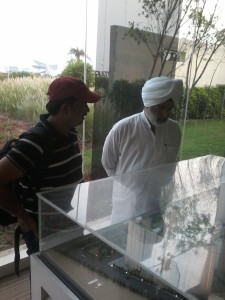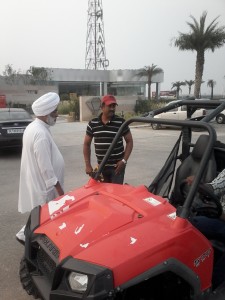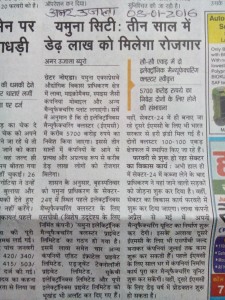Month: July 2016
ONGC Members’ site visit.
GREATER NOIDA: An institute on the lines of Delhi’s All India Institute of Medical Sciences (AIIMS) will be set up in the city soon, at a cost of Rs 800 crore.
Greater Noida Industrial Development Authority (GNIDA) officials said on Saturday the UP cabinet had approved the Institute of Medical Sciences – a 500-bed hospital-cum-medical education institute – last month and notification for the same will be out by February 20. To begin with, the institute will make available 150 MBBS seats and its first academic session could commence from July this year.
After coming to power, the Samajwadi Party government had in July 2012 approved the proposal to open a medical university in Greater Noida to “boost education facilities and health services across the Gautam Budh Nagar district”.
Deepak Agarwal, CEO of GNIDA, told TOI the medical institute, located on the campus of Gautam Budh University in Greater Noida, is already in place. “Now this facility will be converted into the Institute of Medical Sciences,” Agarwal said. “Currently it is under GNIDA but will be taken over by the medical education department, UP government, and will be run under the Society Act,” he added.
The official said the institute has been certified by King George’s Medical College, Lucknow, and the Medical Council of India has also given the requite approval. “Principal secretary of medical education Anup Chandra Pandey, who had inspected the institute in December last year, and chief secretary Alok Ranjan have also given their go-ahead for the project,” Agarwal said.
According to the plan, the autonomous institute will have infrastructure and teaching staff at par with any other premier private medical institute in the country, but will be affordable. This will give students a chance to pursue MBBS course irrespective of their economic background, officials said.
The proposed 500-bed hospital will have 150 intensive care unit beds, 300 doctors, 250 nurses, 450 pharmacists and a total of about 1,000 faculty members. “The bylaws are already ready. Other formalities are likely to be completed soon. If all goes as per plan, we could start the first academic session by July this year,” said Dr AK Bhatt, director of the institute.
“We are now awaiting the notification from the state government, which is expected by February 20,” he added
GREATER NOIDA: The Yamuna Expressway Industrial Development Authority (YEIDA) will soon allot land for a second electronic manufacturing cluster (EMC) in its area. An in-principle approval for the proposed cluster was granted by the Centre’s department of electronics and information technology (DeitY), on Tuesday.
This will be Uttar Pradesh’s third electronic cluster. While two will be located in the YEIDA area, a third has been sanctioned in Greater Noida.
According to YEIDA officials, the meeting was convened by the DeitY secretary, where Arun Vir Singh, CEO of YEIDA, and other senior officials were also present. “We have earmarked 100 acres in Sector 24 of YEIDA area, which is located along the Yamuna expressway. Plot No. 3A has been reserved for the proposed cluster,” said Singh.
“The proposal will now be forwarded to Electronic Corporation of India Limited (EICL), the promoter for approvals and further action,” he added
GREATER NOIDA: Two ambitious big-ticket projects of Greater Noida hanging fire for almost several years are likely to see the light of day soon. This was said by Deepak Agarwal, CEO, Greater Noida Industrial Development Authority (GNIDA) on Monday after a joint board meeting of the three development authorities of Gautam Budh Nagar.
According to GNIDA officials, the Board on Monday has approved in-principle draft Request For Proposal for both projects. “Soon we will initiate the RFP and invite companies to come forward with their proposals,” Agarwal said. “This is a step forward for the two projects, which are on the UP chief minister’s list of priorities,” he said.
Officials further said that while the Detailed Project Report (DPR) for the Heliport has already been approved, along with a No Objection Certificate from the Uttar Pradesh Irrigation department. The Rs 50 crore heliport will be constructed across a 22-acre open area falling in Safipur village, which is located along the Noida-Greater Noida expressway near the Gautam Budh University. “An additional 15 acre of land has also been reserved for future expansion of the aviation project,” said Agarwal. “After the RFP, we will select a consultant for the project to be developed on PPP model. This process should be completed soon, after which work on the project will commence,” he added. The project will be in place two years after construction starts.
Agarwal further detailed the ambitious Night Safari project saying the business plan for the proposed project was also in place. The project is to be developed on PPP model. As per the business plan, the developer will be allowed commercial activity in the reserved recreational green area. This has been done so that the project becomes viable and any losses meted out. This activity could include putting up a resort, club, bar, etc. The Rs 750 crore project will be developed across 337 acres. The core area will be built across 200 acres, while the rest of the area will be used for business activities. Once tenders are finalized and construction commences, the project to be developed on land adjoining Gautam Budh University campus on Yamuna Expressway is expected to be delivered to public by 2017.
NOIDA: Delhi Metro Rail Corporation MD Mangu Singh said on Sunday the Noida-Greater Noida Metro project is on course for completion within its deadline and the track is expected to be ready for trials by July 2017.
He also said that civil engineering work onm the track will be over by March 2017.
Singh last week inspected the corridor, work on which started in May, and expressed satisfaction with the pace of work. The Greater Noida Metro link is expected to roll out by December 2017.
Singh’s inspection of the Metro work followed one by Noida Authority chairman Rama Raman earlier this month. Raman had on October 10 kickstarted work on laying of the track’s first pillar at Delta-1 in Greater Noida.
According to the DMRC officials, till now a total of 15 piling rigs out of 18 have been mobilized and 700 piles, the foundation for the pillars, out of 5,000 have been made. Shifting of utilities along the corridor is also under progress. “Trees falling along the alignment of the track have been shifted to other locations Around 400-500 trees have been shifted and around 1,100 trees have been saved by shifting of piers of the track,” said Raman. “Meanwhile, saplings are being planted at various locations by DMRC officials and there is a plan to plant around 30, 000 trees,” he added. Singh also planted trees at the two casting yards during his inspection.
The 30km Noida-Greater Noida corridor will have 21 elevated stations and a depot in Greater Noida, of which 15 stations fall in Noida and 6 including the depot station fall in Greater Noida. All the stations will be equipped with platform screen doors, solar panels and rainwater harvesting facilities.
The corridor has two casting yards, one near Sector 149 Metro station and the other at depot station in Greater Noida. Two casting yards were planned owing to the length of the line and shortage of time to complete the project. According to DMRC officials, to facilitate work on the corridor at a faster pace, pre-cast pier caps and pre cast U-girders of 27
metres length will be used. “These will be cast at both the casting yards simultaneously. The casting of U – girders has already begun and out of a total 1,000 U-girders, 10 U-girders have already been casted this month,” said an official.
The corridor will cross the Dedicated Railway Freight Corridor and the Yamuna-Agra flyover. It will have its highest point near Knowledge Park II station. This station will also be connected to the Greater Noida Expo Centre and Special Economic Zone through walkalators. Noida-Greater Noida corridor will be linked with the upcoming Noida City Centre to Sector 62 Metro corridor.
READ ALSO: Gurgaon best bet for office, Noida loses out
Right on top, beating Gurgaon, is Noida. And it is the best city to live in NCR because its civic infrastructure is more evolved and cost of living moderate.
According to the ‘Residential Preference Survey 2015’ by real estate services and consultancy giant Colliers International, India, living in Noida is the best bet for people who like to lead a hassle-free and laidback life with enough amenities, even though many residents may have to travel long distances to Delhi or Gurgaon for the sake of their jobs.
In the study, Gurgaon has predictably emerged as NCR’s office district. It is the swishest NCR city and creates most employment, but also has the most expensive real estate.
READ ALSO: State will develop Gurgaon into smartest city, Khattar says
The research by Colliers on the basis of a Pestle study of comparative indices— based on political, economic, social, technological, environmental and legal parameters—includes five NCR cities of Gurgaon, Noida, Faridabad, Greater Noida and Ghaziabad. Colliers compiled its research with the help of field experts, as well as secondary sources like NUMBEO, Wikipedia, Google and other government databases.
“Pestle is a strategic tool which gauges macro environmental factors. Accordingly, we ranked cities on parameters such as political, economic, social, technological, environmental and legal, which impact a person’s decision making on which city to live in. The research shows some interesting pointers,” Surabhi Arora, associate director (research) at Colliers International, India, told TOI.
It appears from the study that when people choose a city to live in or invest in property, political stability is one of the most important deciding factors. “To determine political stability, we have taken qualitative indices of crime in the cities over the past six months. It revealed Faridabad as the most stable across a combination of factors, with Ghaziabad the least stable. Gurgaon, Noida and Greater Noida are all at par,” Arora said. However, Ghaziabad is the most crime-prone with 79.30 points according to the survey. Noida and Greater Noida are both at 57.79 points.
In economic indices, Gurgaon, at 160.27 points, is the most expensive NCR city to live in, while Noida stands at 93.94 points. “This shows that for the same basket of goods — a qualitative combination of rent, grocery, restaurants, etc — you spend a low of Rs 93.94 in Noida, but a high of Rs 160.27 in Gurgaon,” Arora said.
In social indices, Gurgaon scored the highest in healthcare facilities at 78.17 points, based on secondary sources. “Although professionals choose to live in Gurgaon because most corporate offices are located there, in the long term, and in terms of lifestyle quality, Noida is so far the best bet in NCR,” Arora said.
So, you can safely live in Noida and work in Gurgaon, and get the best of both worlds



